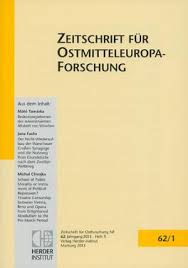Die Entdeckung der „Völkermischzone“ Ostmitteleuropa im Blick deutscher Statistiker und die Berechnung bevölkerungspolitischer Programme in der ersten Hälfte des 20. Jahrhunderts
Discovering the “Ethnic Melting-pot Zone” East Central Europe under the Gaze of German Statisticians and the Calculation of Population Policy Programs in the First Half of the Twentieth Century
Author(s): Philipp KrögerSubject(s): Social history, Nationalism Studies, Pre-WW I & WW I (1900 -1919), Interwar Period (1920 - 1939), Ethnic Minorities Studies, Politics and Identity
Published by: Verlag Herder-Institut
Keywords: statistics of nationality; nationalities; ethnicity; East-Central Europe; Actor-Network Theory;
Summary/Abstract: Despite recent research on the concept of ethnic hybrid borderlands and the critique of its use in contemporary historical research, it is still commonly consulted to explain ethnic or national conflicts. Taking up this critique—ethnic hybridity is the explanandum and not the explanans—this article argues that statistics of nationality played a crucial role, not only in the construction of ethnicity in general, but particularly in the emergence of the idea of ethnic hybridity. Therefore, it examines German statistics concerning nationality and the gaze of the German statistician on East Central European territories in the first half of the twentieth century. By using a theoretical approach that combines elements of Actor-Network Theory and discourse analysis it can be shown how statistical data on nationality and its cartographical visualizations were the result of a highly complex production process. Within this process, ethnic hybridity was, in the beginning, an unintended side effect of the initial idea to measure nationality by following a binary logic of national affiliation. In the course of the first half of the twentieth century, hybridity and the impossibility of linear ethnographic borders—both products of statistical measurement—formed the focus of statistical research on nationality. This did not only affect the statistical debate on nationality but changed the perception of nationality and ethnicity itself.
Journal: Zeitschrift für Ostmitteleuropa-Forschung
- Issue Year: 68/2019
- Issue No: 2
- Page Range: 223-248
- Page Count: 26
- Language: German

